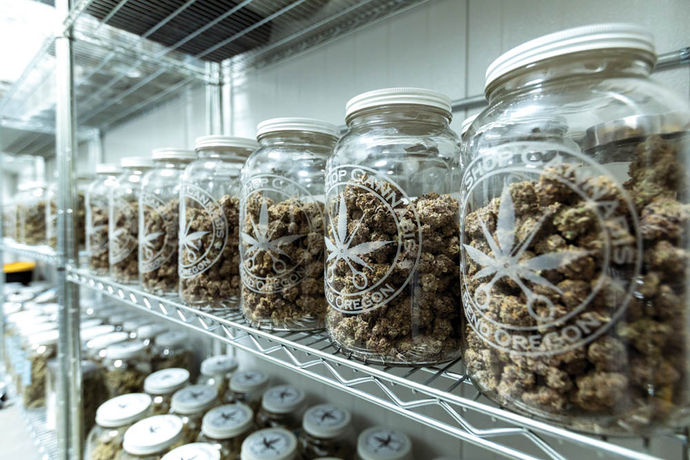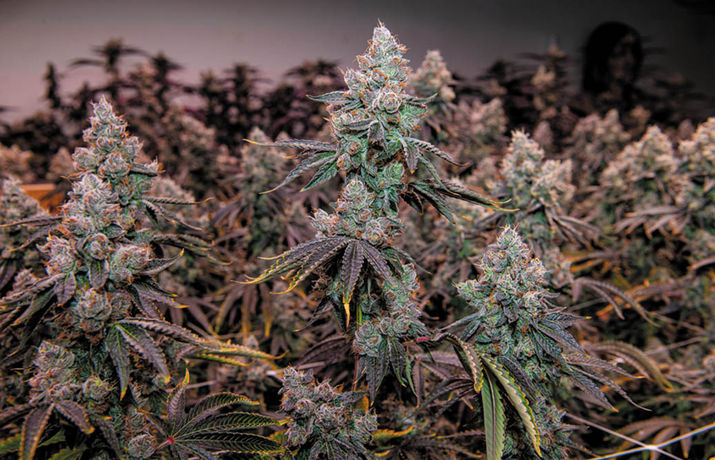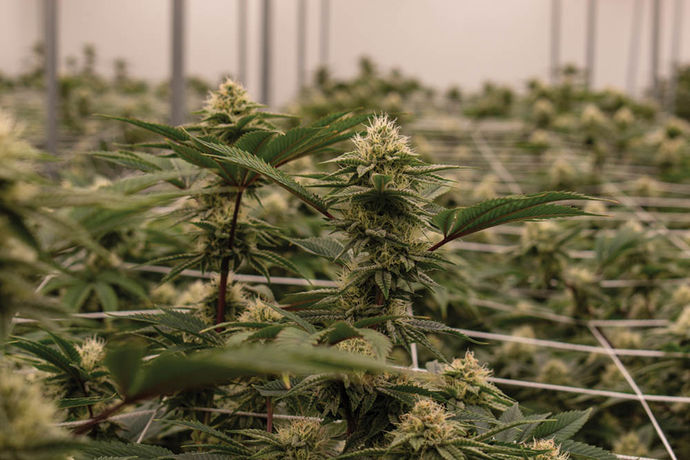The first time you see a member of Sisters of the Valley, you’re likely to do a double-take. After all, it’s not every day you see someone dressed in a nun’s habit hitting a J.
For the better part of a decade, the group of plant health advocates and sociopolitical activists has crafted cannabinoid cures with a reverence that permeates everything they do, whether it be impacting social change or producing their line of wellness products and teas at their facility in San Joaquin Valley. We connected with Sister Kate and discussed how her collective came to be, what it stands for, and where it’s going.
How did Sisters of the Valley come to be?
The Sisters of the Valley began as an idea born of the Occupy Movement. It’s an old idea, as ancient as people, that the women live together, work together, pray together, and remain independent of contemporary religions. That the women identify their enclave by the clothing they wear. And the women are scholars and activists and take an active role in making or breaking local politicians and priests. This is the legacy of our Beguine mothers, who had the first organized nurses serving the people and the castles of the Middle Ages in Europe.
When the media dubbed me ‘Sister Occupy’ in 2011, that one act of rebellion resulted, four years later, in the formation of the Sisterhood. As Sister Occupy, I attended protests all over California, and met many people who encouraged me to formalize the belief system and begin an order. We had years of discussing what a new age order of Sisters would look like. We knew what it wouldn’t be, and we had to figure out what it would be. We knew we didn’t want to be begging for alms and we knew we did want to be self-sustaining. Like our Beguine ancestors, we would farm, create products, and own businesses and property. We would put Mother Earth back at the center of all spiritual practices. Maybe the enclaves would grow, and we could make places that rescue throw-away women and throw-away people. That remains the dream.
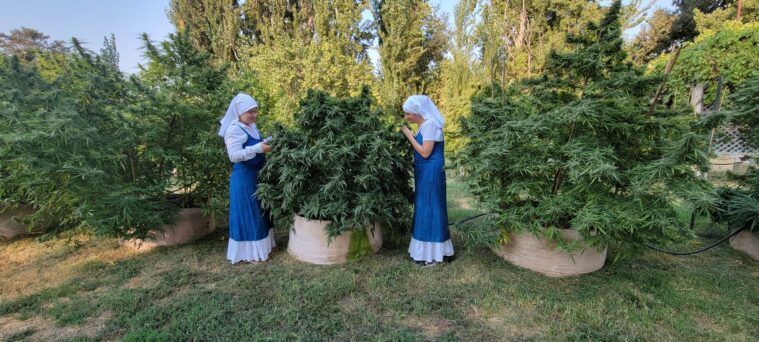
What is the mission of Sisters of the Valley?
Our mission is to get the most plant medicine to the most people around the world, and to do it ethically, excellently and sustainably. At the same time, we hope to put more small businesses in the hands of the women. We believe that the world will right itself when women are restored to power, or hell, just not left suffering the brunt of all poverty in all nations.
What is the significance of adopting lifestyle elements traditionally associated with religious institutions?
The men and the women of the tribe are required to be in uniform for making medicine, for public events, when visitors are on site, and at ceremonies. The uniform is a daily meditation in being in touch with our ancient ancestors; it is our regalia announcing to our tribe that we are serious, chaste, dedicated people of plant medicine. The uniform keeps the hair out of the way when we work, in the same manner it did for our ancient mothers. The uniform binds us and reminds us to set down our individuality for a moment and be one with the tribe. We wear the gowns to honor our ancient Beguine foremothers and to show respect for the plant and Mother Earth. We cover ourselves modestly to connect us to the same healing energy of our ancient Bougienages.
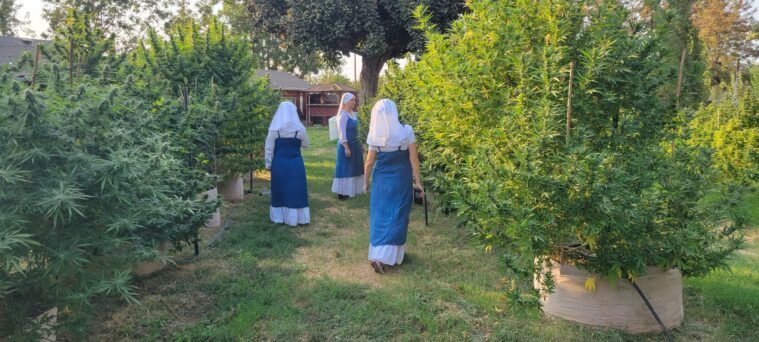
What are some highlights among the products you create? Do you have your own favorites?
It’s trimming season and I couldn’t live without our topical salve. This time of year, I leave the office every day around 2:00 p.m. and work with the plant until 9 p.m. And that leaves my hands sticky and muddy, and soap and water is the long, hard way to get your hands clean, and will leave them rough. Our topical salve and a rag or piece of paper towel will take it all off and leave your hands silky smooth. When we are trimming, there is always a jar of salve nearby, just saying.
As we learn to ride the ups and downs of the marketplace, I don’t think any of us are as stressed as we used to be. We have kind of found our groove, here on the farm, and the stress level has really gone down as we rotated out the drama queens and divas, and rotated in some board-level women. However, no matter how peaceful things are on the home front, you can always count on the universe to stir things up and when we get anxious around here, or have trouble sleeping, we take the oil or tincture drops – and we certainly use those same products for the farm pets, when they are having issues. Gel caps are pure plant oil and those are reserved for serious illnesses, although, when I turned 60, I started taking one every night and found that it really helps me ‘stay asleep.’ I’m not as restless, regardless of anxiety, regardless of earthquakes, smoke in the air from fires surrounding us, or planetary retrogrades.
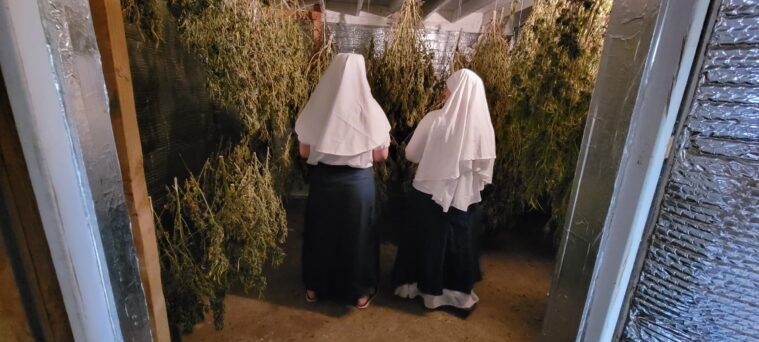
Tell me about the Sisters. How many of you are there? How is the collective structured?
A few years ago, code enforcement of Merced County decided they were NOT going to allow an order of weed nuns to spring up in their county, and they started hassling us. We couldn’t have a sister in the RV, like we did. We couldn’t have a sister in the yurt, like we did. So, we bought another house nearby and spread out. We would like to be all together, and we will manage that at some point, but for now there are three who live on the farm – with Sister Maria being the fourth, coming from New Zealand early in the new year. Nearby, we have two other sisters who come to work here every day. In Mexico, we have nine sisters, but they are all still operating as ‘satellite sisters’ with our Merced farm being their mother farm. The Mexico sisters come and stay one month or two months at a time and work with us – they help and learn, and have recently opened their own store. Sister Rosa is in Sweden and she has formed a Northern Europe enclave with one sister each in Denmark, Belgium and Norway. The four meet four times a year for ceremonies, also preparing to settle a farm that was recently purchased. As I write this, Sister Flora is visiting from Brazil. Brazil has something like 15 million people and they have issued 500 of them permission to grow Cannabis for personal health reasons, and Sister Flora is one of them. She works with us, learns and shares her knowledge.
In England, Brother Matt has been operating a store reselling our products for four years now. But in places like Brazil and Sweden, the sisters cannot jump into our business. It will get them jailed or killed. We have to play the long game. Watch the legislation change, as we know it will. Participate in pushing the reforms needed. Connect with the 420 influencers in each nation. Lawyers, doctors, growers, filmmakers, media. Sister Flora has begun to grow her enclave in Brazil, with primarily filmmakers and storytellers who can influence the change that is needed in human perception to counteract the very expensive propaganda campaign that got them all believing Cannabis to be the devil’s weed to begin with.
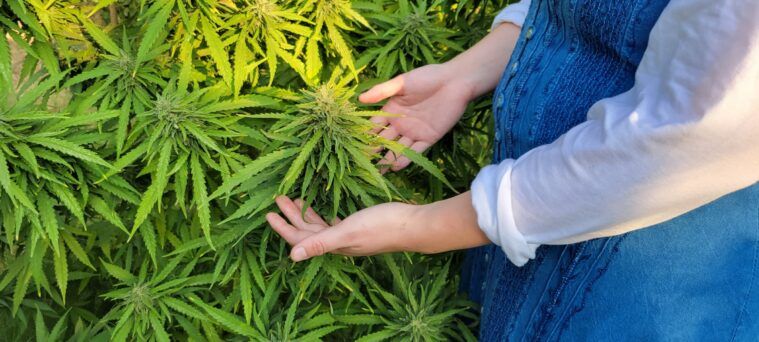
How does someone become a Sister of the Valley? Are there any interesting journeys to highlight among those who’ve joined your numbers?
The starting point, if someone is interested in joining us, is to tell us who they are and make sure they understand who we are. To facilitate this process of information exchange, we have a place on Patreon (sistersoftheCAvalley). Patreon hosts our fellowship program and at this point, we don’t invite anyone to anything unless they have gone through this process. Periodically, we invite people to come stay with us and work with us on the farm for one to six weeks. Those invites are only extended to the fellowship program members. From the visitors, we know who would make a good sister and who wouldn’t. That’s how Sister Rosa began in Sweden and Sister Maria began in New Zealand and Sisters Camilla and Luna began in Mexico and how Sister Flora, Marilyn and others began.
Every Sister’s journey is interesting … Sister Sophia was born in South Africa and immigrated to Michigan when she was young. Sister Quinn was born in Canada, but immigrated to the U.S. when she was young. Sister Maria is now in the process of immigrating here for three years. These women have stories. Trimming season is my favorite time of year because we don’t query each other about our pasts. That stuff has to come out naturally, and over the sacred weed, stories have a special solemnity.
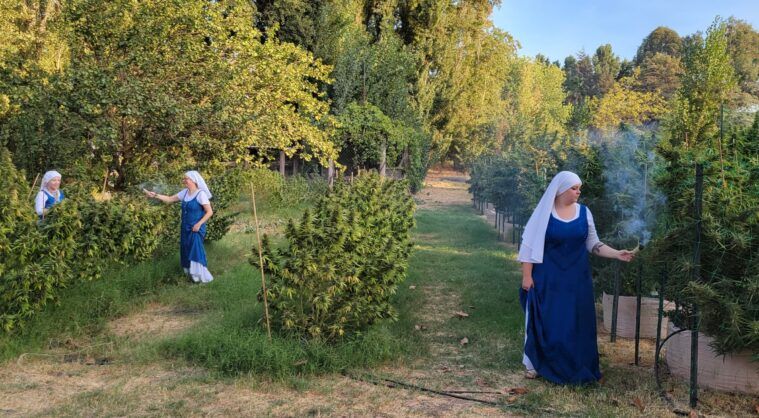
How do you feel about the way the Cannabis community is currently growing?
Like everyone in the industry, the big corporations make me nervous as hell. They should make everyone nervous, as they prove to be soulless ghouls whenever given power. But the fact that ‘educating the masses on the medicinal values’ is over now in California, is a sigh of relief. We have moved on, it’s not necessary to campaign and educate as every doctor, every child, every old person, every pet knows here. That’s very cool and kind of shocking when we step out to other countries and see that the battle to educate hasn’t even begun.
I am sad that it is taking so long for the hemp industry to get going in this country and hope that this current administration does something about it. The government worries me when hemp is the antidote to plastics and it’s so obvious. Can I plug for the Hemp Industry Association? (www.thehia.org) They are at the front lines of the fight in Washington for the deregulation of hemp.
What does the hopeful future hold for the Sisters of the Valley?
During the Covid lockdown, we developed our own recipe for a mood-stabilizing mushroom coffee, built a mushroom powder lab and launched the first two products. We now need to get that offered in individual packets and spend some time educating people on the health benefits. And just this week, I learned that some of the essential oils in our salves and drops are not pet-friendly and though we have long resisted making a pet line, we are now considering doing just that in the first quarter of the new year. Our plans haven’t changed in the last seven years. We have always wanted to have enclaves in every province and state in the world, and we still dream of this.


